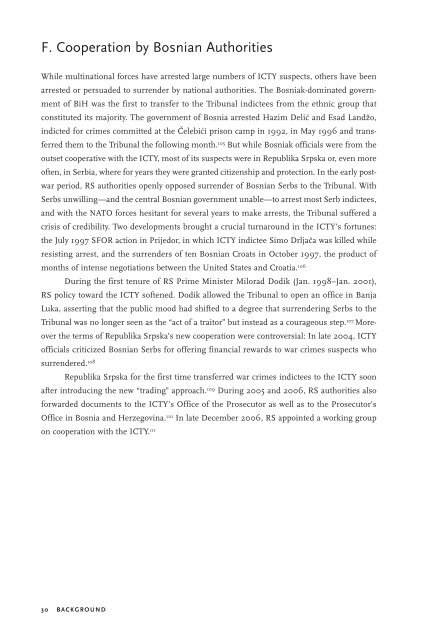That Someone Guilty Be Punished - Open Society Foundations
That Someone Guilty Be Punished - Open Society Foundations
That Someone Guilty Be Punished - Open Society Foundations
Create successful ePaper yourself
Turn your PDF publications into a flip-book with our unique Google optimized e-Paper software.
F. Cooperation by Bosnian Authorities<br />
While multinational forces have arrested large numbers of ICTY suspects, others have been<br />
arrested or persuaded to surrender by national authorities. The Bosniak-dominated government<br />
of BiH was the first to transfer to the Tribunal indictees from the ethnic group that<br />
constituted its majority. The government of Bosnia arrested Hazim Delić and Esad Landžo,<br />
indicted for crimes committed at the Čelebići prison camp in 1992, in May 1996 and transferred<br />
them to the Tribunal the following month. 105 But while Bosniak officials were from the<br />
outset cooperative with the ICTY, most of its suspects were in Republika Srpska or, even more<br />
often, in Serbia, where for years they were granted citizenship and protection. In the early postwar<br />
period, RS authorities openly opposed surrender of Bosnian Serbs to the Tribunal. With<br />
Serbs unwilling—and the central Bosnian government unable—to arrest most Serb indictees,<br />
and with the NATO forces hesitant for several years to make arrests, the Tribunal suffered a<br />
crisis of credibility. Two developments brought a crucial turnaround in the ICTY’s fortunes:<br />
the July 1997 SFOR action in Prijedor, in which ICTY indictee Simo Drljača was killed while<br />
resisting arrest, and the surrenders of ten Bosnian Croats in October 1997, the product of<br />
months of intense negotiations between the United States and Croatia. 106<br />
During the first tenure of RS Prime Minister Milorad Dodik (Jan. 1998–Jan. 2001),<br />
RS policy toward the ICTY softened. Dodik allowed the Tribunal to open an office in Banja<br />
Luka, asserting that the public mood had shifted to a degree that surrendering Serbs to the<br />
Tribunal was no longer seen as the “act of a traitor” but instead as a courageous step. 107 Moreover<br />
the terms of Republika Srpska’s new cooperation were controversial: In late 2004, ICTY<br />
officials criticized Bosnian Serbs for offering financial rewards to war crimes suspects who<br />
surrendered. 108<br />
Republika Srpska for the first time transferred war crimes indictees to the ICTY soon<br />
after introducing the new “trading” approach. 109 During 2005 and 2006, RS authorities also<br />
forwarded documents to the ICTY’s Office of the Prosecutor as well as to the Prosecutor’s<br />
Office in Bosnia and Herzegovina. 110 In late December 2006, RS appointed a working group<br />
on cooperation with the ICTY. 111<br />
30 BACKGROUND

















